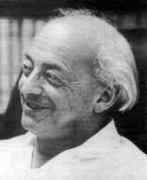Person: Baer, Reinhold

Reinhold Baer's mathematical work was wide ranging; topology, abelian groups and geometry. His most important work, however, was in group theory, on the extension problem for groups, finiteness conditions, soluble and nilpotent groups.
Mathematical Profile (Excerpt):
- Emil Baer had been born in Kempen, Posen, Prussia (since 1920 this town is Kepno, Poznań, Poland) on 10 October 1861 but at the time Reinhold was born he was living in Berlin where he was a successful clothing manufacturer.
- Sadly, it is relevant to the events of Baer's life to say at this point that both his parents and his four grandparents were Jewish.
- Baer began his studies at the Kaiser Friedrich Schule in Charlottenburg in 1908.
- Baer won a scholarship for specially gifted students in 1924 and this enabled him to study at Kiel for a year with Helmut Hasse, Ernst Steinitz and Otto Toeplitz.
- During this year in Kiel, Baer wrote up his doctoral dissertation Kurventypen auf Flächen Ⓣ(Types of curves on surfaces), and presented it to Göttingen in 1925.
- Baer held this assistant position from 1926 until 1928 and, during this time, he turned towards algebra.
- There was another influence on Baer at Freiburg, however, namely Wolfgang Krull.
- According to Baer's own account he complied, but grudgingly.
- Their marriage took place in 1929 and Reinhold and Marianne had one son, Klaus Baer who become an Egyptologist and professor at the University of Chicago's Oriental Institute and also in its Near Eastern Languages Department.
- Baer habilitated at Freiburg on 1 March 1928 and taught his first course there during the summer semester.
- Baer's marriage was an extremely happy one but he gained mathematically as well.
- Baer and Levi began a mathematical collaboration which lasted until Levi's death in 1966.
- They turned Steinitz's paper into a book with a commentary on the text and an appendix on Galois theory written by Baer.
- While Baer was on holiday in Igls, near Innsbruck in Austria, with his wife, Hitler came to power and Baer was required to complete a questionnaire to comply with the "Law for the Restoration of the Professional Civil Service" enacted on 7 April 1933.
- Helmut Hasse was fully aware of Baer's predicament and he contacted Louis Mordell in England.
- Mordell sent Baer an invitation to go to Manchester which he gladly accepted.
- Marianne and Reinhold knew hardly a word of English, but they quickly learned to speak effortlessly and fluently, and were happy to be in Manchester.
- The Taylors had a cottage in the Peak District and the Baers often spent week-ends with them there, as well as longer periods hiking in the Lake District.
- After going to Oxford to meet Weyl, who was based at the Institute for Advanced Study in Princeton but spending 1934-35 in Oxford, Baer received an invitation to Princeton which he accepted and spent two years, 1935-37, as a member of the Institute for Advanced Study.
- This was a wonderful time for Baer, both from the exciting mathematics and from the rural setting in hills and woods that he so enjoyed.
- Baer had begun studying infinite abelian groups while at Manchester and he continued his study of this topic at Princeton; in fact he lectured for a term in Princeton on infinite abelian groups.
- However, the Baers did not find Illinois the ideal place to live since, as we have seen from their time in Germany, they loved the mountains.
- Now the United States is not short of mountains and the Rockies provided exactly the type of scenery that Baer loved.
- Often other friends stayed with the Baers at Estes Park, including Richard Brauer, Hermann Weyl and Max Dehn.
- Baer also had a very positive effect on the development of the Mathematics Department: in particular he was responsible for Michio Suzuki coming to Illinois - a crucial event that led to the Department becoming a centre of research in finite simple group theory.
- However, Baer did not enjoy certain aspects, particularly teaching low level undergraduate mathematics of a standard that he considered "high school mathematics".
- Baer retired from his professorship at Frankfurt in 1967 and, again showing his love for the mountains, he settled in Zürich.
- Once or twice a year Baer would transfer his seminar to Oberwolfach for week-ends or, occasionally, for a whole week.
- This, of course, was a very good occasion for closer scientific and personal contact within the group; the general climate was set by Reinhold and Marianne Baer.
- Probably Baer's most important work, however, was in group theory; on the extension problem for groups, finiteness conditions, soluble and nilpotent groups.
- Many concepts in this area were introduced by him, in particular the Baer radical of a group and Baer groups (groups in which every cyclic subgroup is subnormal).
- This was a sad occasion as by this time Baer knew that he was seriously ill (with stomach cancer).
- An operation in 1978 was successful and Baer enjoyed a while longer creating the mathematics he loved and communicating it to others showing his excitement and joy in his subject.
- Among the honours given to Baer, we mention that he received honorary degrees from the University of Giessen in 1974, The University of Kiel in 1976, and the University of Birmingham in 1978.
Born 22 July 1902, Berlin, Germany. Died 22 October 1979, Zürich, Switzerland.
View full biography at MacTutor
Tags relevant for this person:
Group Theory, Origin Germany
Thank you to the contributors under CC BY-SA 4.0! 

- Github:
-

- non-Github:
- @J-J-O'Connor
- @E-F-Robertson
References
Adapted from other CC BY-SA 4.0 Sources:
- O’Connor, John J; Robertson, Edmund F: MacTutor History of Mathematics Archive
